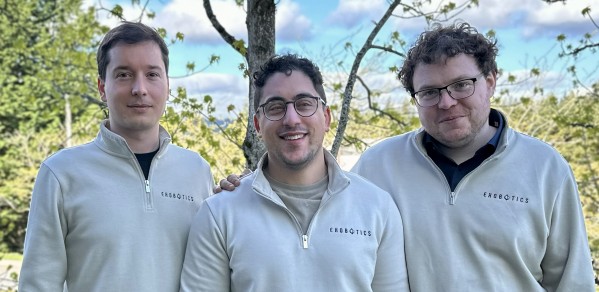
Late 2018, during their PhDs in the Engineering Department three friends started a satellite manufacturing company called Exobotics. 2020, they won their first funding; 2022, they delivered their first satellites; 2024, they are on a mission to make space accessible to everyone.
Many of the technologies we rely on today are underpinned by satellite technology, from GPS to climate monitoring. Excitingly, we’ve seen phenomenal growth in innovation and investment into the new space technologies being developed globally, particularly in the UK.
Peter J. Christopher CSO at Exobotics
When Nadeem Gabbani founded Exobotics in 2018 and needed some volunteers to help him, he recruited his friends Maxime Burgonse and Peter J. Christopher to assist.
Nadeem Gabbani (CEO) did a PhD with Professor Bill O’Neill (Institute for Manufacturing) in Ultra-Precision Engineering focused on propulsion. At Exobotics, Nadeem is the principal engineer.
Maxime Burgonse (CTO) did a PhD with Professor Michael De-Volder (Institute for Manufacturing) in Space Propulsion. At Exobotics, Maxime is responsible for test and quality assurance.
Peter J. Christopher (CSO) did a PhD with Professor Timothy D. Wilkinson (Electrical Engineering Division) in Optical Engineering. At Exobotics, Peter is responsible for software development and embedded systems.
Speaking about the team, Professor Bill O’Neill says "Having observed their relentless innovation and determination over many years, Nadeem and his team have transitioned from shaping theories to executing them in the space industry. This impressive leap from academia to entrepreneurship not only highlights their profound expertise but also celebrates their ability to transform academic excellence into groundbreaking industry leadership. Congratulations on pioneering such a remarkable venture—it’s a testament to their vision and hard work."
We caught up with Peter to find out more.
What is the background of Exobotics?
We’re a satellite manufacturing company. We started up in late 2018 as a group of 3 Cambridge Engineering PhD students and have been growing steadily ever since.
Please explain the services and products that you offer and the sorts of projects you work on.
Exobotics manufactures high-tech satellites for a range of customers. We’re growing rapidly and will be launching four satellites in the next nine months.
Our mission is to work closely with high-tech companies and help them to put their technology payloads into space. We’re pretty much unique in how fast we can do this and we’ve taken missions from concept to delivered satellite in less than nine months, less than half the industry standard. We are extremely focused on customer service and integration with our partners to ensure project success.
What will be the potential real-world impact of your technology?
Space is one of the fastest growing sectors in the UK economy with a massive downstream impact for consumers and businesses alike. Many of the technologies we rely on today are underpinned by satellite technology, from GPS to climate monitoring. Excitingly, we’ve seen phenomenal growth in innovation and investment into the new space technologies being developed globally, particularly in the UK.
Where Exobotics fits in is the delivery and we work closely with our customers, deploying their technology into space by designing and building satellites around their payloads. We can then test and operate these to give an end-to-end package for our customers and allow them to remain focused on their own technology.
We take your technology and put it into space for you.
What are your future goals?
Bigger, faster, stronger! We’ve got a schedule of satellites and satellite constellations coming up. A large part of our pitch to our customers is that we provide best-in-class technology and we’re working hard to extend our portfolio and the range of capabilities of our flagship XO-BUS satellite design. We’re also significantly increasing our manufacturing capacity so we can build and operate constellations of larger satellites.
Most importantly, though, we already get to work with some of the most cutting-edge space companies and organisations in the world and we’re excited to carry on doing this!

